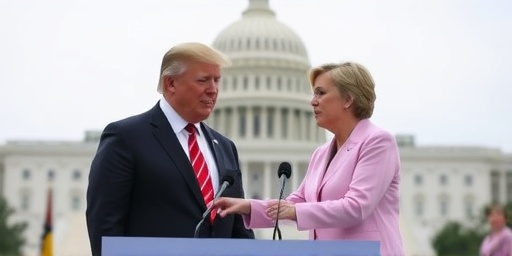In the wake of a grueling 43-day Government shutdown that paralyzed federal operations and cost the economy billions, Senate Democrats are reeling from accusations of betrayal as they failed to secure critical healthcare subsidies in the final funding deal. The shutdown, the longest in U.S. history, ended abruptly last week without the promised protections for Affordable Care Act enrollees, igniting a fierce party rift that threatens to undermine Democratic unity heading into the 2026 midterms.
- Shutdown’s Economic Scars: Billions Lost and Families Left in Limbo
- Negotiations Crumble: How Healthcare Subsidies Became the Shutdown’s Casualty
- Party Rift Erupts: Progressives Accuse Leadership of Surrender
- Congressional Fallout: Blame Game Intensifies as Midterms Approach
- 2026 Shutdown Shadows: Experts Predict Renewed Fiscal Brinkmanship
Shutdown’s Economic Scars: Billions Lost and Families Left in Limbo
The Government shutdown, triggered by partisan battles over spending priorities, brought Washington to a standstill from mid-October to early December. Federal workers went without paychecks for over a month, affecting more than 800,000 employees across agencies like the FBI, TSA, and national parks services. According to a report from the Congressional Budget Office, the shutdown inflicted an estimated $11 billion hit to the U.S. economy, with ripple effects felt in delayed IRS processing, halted food safety inspections, and postponed veterans’ benefits.
At the heart of the impasse were Democrats’ demands for enhanced healthcare subsidies under the Affordable Care Act (ACA), aimed at capping premiums for low- and middle-income Americans. These subsidies, which expired at the end of 2025, were projected to benefit over 13 million people if renewed, according to the Kaiser Family Foundation. Without them, experts warn, insurance costs could surge by 20-30% in 2026, pushing millions toward uninsured status.
“This wasn’t just a funding fight; it was a lifeline for families struggling with skyrocketing medical bills,” said Sen. Elizabeth Warren (D-MA), a vocal critic of the deal. Her words echoed the frustration of progressive lawmakers who viewed the subsidies as non-negotiable. Yet, as the shutdown dragged on, public approval for Democrats plummeted, with a Gallup poll showing only 35% support for their handling of the crisis—down from 48% pre-shutdown.
The economic fallout extended beyond federal coffers. Small businesses reliant on government contracts reported losses exceeding $2 billion, per the National Federation of Independent Business. In states like California and New York, where ACA enrollment is high, hospitals braced for a wave of uninsured patients, potentially overwhelming emergency rooms and driving up costs for all.
Negotiations Crumble: How Healthcare Subsidies Became the Shutdown’s Casualty
Behind closed doors in Congress, the push for healthcare subsidies unraveled amid escalating tensions. Democrats, holding a slim majority in the Senate, entered talks with Republicans demanding concessions on border security and defense spending. House Speaker Mike Johnson (R-LA) insisted on tying any ACA extensions to stricter immigration reforms, a non-starter for many Democrats.
Senate Majority Leader Chuck Schumer (D-NY) faced mounting pressure from both sides. Progressives, led by the Squad—a group of left-leaning representatives including Alexandria Ocasio-Cortez (D-NY)—urged a hardline stance, arguing that yielding on healthcare would alienate the party’s base. “We can’t keep kicking the can on healthcare subsidies while people suffer,” Ocasio-Cortez tweeted during the shutdown’s peak, garnering over 500,000 likes.
Yet, moderate Democrats from swing districts, such as Sen. Joe Manchin (D-WV), prioritized ending the shutdown to avoid voter backlash. Manchin, a key swing vote, reportedly lobbied for a compromise bill that included temporary funding but omitted the subsidies. “The American people are tired of games; we need to get back to work,” he stated in a post-shutdown interview on CNN.
The final agreement, passed in a late-night vote, restored government operations through March 2026 but left healthcare subsidies in limbo. The bill allocated $1.7 trillion in discretionary spending, averting default but drawing ire from Democrats for its lack of social program investments. Critics pointed to a leaked memo from the Senate Finance Committee revealing that initial subsidy proposals could have added $100 billion to the deficit over a decade—fuel for Republican opposition.
This failure highlights deeper issues in Congress, where bipartisan deals on healthcare have grown rarer since the ACA’s 2010 passage. The last major subsidy boost came in 2021 under the American Rescue Plan, which reduced premiums by an average of $800 annually for enrollees. Without renewal, the Urban Institute estimates 2.5 million could lose coverage by mid-2026.
Party Rift Erupts: Progressives Accuse Leadership of Surrender
The end of the shutdown has exposed a widening party rift among Democrats, with progressives launching sharp rebukes against party leadership. In a fiery caucus meeting last Tuesday, Sen. Bernie Sanders (I-VT), who caucuses with Democrats, called the deal “a capitulation to corporate interests,” specifically targeting pharmaceutical lobbyists who opposed subsidy expansions that could curb drug prices.
The divide pits the party’s left wing against centrists, a schism exacerbated by the 2024 election losses that narrowed Democratic margins in Congress. Progressive organizations like Justice Democrats have mobilized, with over 10,000 petition signatures demanding Schumer’s resignation if subsidies aren’t revived in the next session. “This party rift isn’t just talk; it’s fracturing our ability to fight for working families,” said Rep. Pramila Jayapal (D-WA), chair of the Congressional Progressive Caucus.
On the other side, establishment figures defend the compromise as pragmatic. Schumer, in a statement to reporters, emphasized, “We saved jobs and the economy from total collapse. Healthcare subsidies remain a priority, but we couldn’t risk another shutdown.” Polling from Pew Research shows 62% of Democratic voters prioritize economic stability over specific policy wins, giving moderates some ammunition.
This internal discord echoes past fractures, such as the 2017 push to repeal the ACA, which nearly tore the party apart. Today, with Republicans eyeing gains in 2026, the party rift could prove costly. Fundraising data from OpenSecrets indicates progressive PACs have already withheld $15 million in donations to Democratic leaders pending action on healthcare.
Grassroots activists aren’t staying silent. In cities like Chicago and Seattle, protests drew thousands last weekend, chanting “Subsidies Now!” and targeting Democratic offices. One organizer, Maria Gonzalez from Health Access California, shared her story: “My family relies on these subsidies; without them, we’re one illness away from bankruptcy.” Such personal narratives are amplifying calls for accountability within the party.
Congressional Fallout: Blame Game Intensifies as Midterms Approach
In the halls of Congress, the blame game is in full swing, with Democrats pointing fingers at both their own leadership and Republican intransigence. House Minority Leader Hakeem Jeffries (D-NY) accused GOP hardliners of using the shutdown as leverage to dismantle Obamacare piecemeal. “They held the economy hostage to kill healthcare subsidies,” Jeffries said during a press conference.
Republicans, however, celebrated the deal as a win for fiscal responsibility. Senate Minority Leader Mitch McConnell (R-KY) touted the avoidance of “reckless spending,” while downplaying the subsidies’ absence. Yet, even some GOP members expressed relief at the shutdown’s end, with Rep. Chip Roy (R-TX) admitting on Fox News, “No one wins in these standoffs.”
The political ramifications are already evident. A Quinnipiac University poll post-shutdown found 55% of independents blaming Democrats for the impasse, a blow as they court swing voters. Within Congress, attendance at bipartisan healthcare working groups has dropped, signaling eroded trust.
Looking at historical precedents, the 2013 shutdown—lasting 16 days—cost Democrats seats in the 2014 midterms. Analysts from the Brookings Institution warn that this longer episode could amplify losses if the party rift persists. “Voters punish dysfunction,” noted Brookings fellow Darrell West. “Democrats must heal or face electoral consequences.”
Committee hearings are ramping up, with the Senate Health Committee scheduling sessions on subsidy impacts next month. Witnesses, including ACA architects like former HHS Secretary Kathleen Sebelius, are expected to testify on the human cost of inaction.
2026 Shutdown Shadows: Experts Predict Renewed Fiscal Brinkmanship
As Congress eyes the March 2026 funding deadline, fears of another Government shutdown loom large, fueled by unresolved tensions over healthcare subsidies and spending cuts. Economists at Moody’s Analytics project that a repeat shutdown could shave 0.5% off GDP growth, compounding inflation pressures already at 3.2%.
Democrats are scrambling to regroup. Schumer has pledged to reintroduce subsidy legislation in January, potentially as a standalone bill or rider on must-pass infrastructure funding. But with the party rift still raw, passage remains uncertain. Progressive leaders are pushing for a “people’s agenda” summit in early 2026 to unify the caucus around core issues like healthcare.
Broader implications extend to national health policy. Without subsidies, enrollment in ACA marketplaces could drop 15%, per the Centers for Medicare & Medicaid Services, straining state budgets and increasing reliance on Medicaid expansions. Advocacy groups like AARP are mobilizing seniors, who make up 20% of subsidy beneficiaries, to pressure lawmakers.
On the horizon, President Biden’s administration is considering executive actions to mitigate premium hikes, such as enhanced navigator programs for enrollment assistance. However, legal challenges from Republican attorneys general could tie these up in courts.
Ultimately, the path forward hinges on Democrats bridging their internal divide. As one Capitol Hill staffer confided anonymously, “We’ve got six months to fix this, or 2026 becomes a shutdown sequel nobody wants.” With midterms on the line, the stakes for party unity and healthcare access have never been higher, setting the stage for intense negotiations that could redefine Democratic priorities for years to come.








